I'm busy, detail oriented, cost conscious and highly selective as to whom works in and/or around my home. This is a service based company that actually provides superior service. Don't waste anymore time... call them. ~ a satisfied customer for three years.
The Best and Fastest Way to Exterminate Bed Bugs
 When bed bugs get into your home, extermination is challenging. These parasitic insects feed on the blood of the host. The usual infestation areas are mattresses, box springs, carpets, and baseboards. They can even hide in the tiniest places, such as wall indentations.
When bed bugs get into your home, extermination is challenging. These parasitic insects feed on the blood of the host. The usual infestation areas are mattresses, box springs, carpets, and baseboards. They can even hide in the tiniest places, such as wall indentations.
Keeping these insects from spreading is difficult. Killing them is indeed frustrating. One method that is excellent in killing bed bugs is using heat. If you have not heard of this method before, this article is perfect for you.
Using Heat to Kill Bed Bugs
The use of heat is simple and effective. As a matter of fact, it is the best chemical-free technique available for bed bug treatment. The process of using this technique is detailed below.
The treatment works by introducing heat inside the house to a level bed bugs cannot survive. It is like being in a sauna. The temperature is intense inside the room. Every corner of your home will be heated, and no escape is allowed for a certain period of time.
Typically, the treatment is performed by introducing heated air until the temperature reaches between 135 and 150 degrees Fahrenheit. At 122 degrees, adult bed bugs and their eggs die immediately. To make sure that every insect is eliminated, the temperature is kept that high for several hours.
Since these parasites and their eggs are difficult to see, the heat reaches them in hidden places where it’s impossible to find them.
A heater is required for the process. It should be large enough to cover your entire house. Professional pest control companies utilize huge heaters that are very effective in exterminating bed bugs.
Advantages of Heat Treatment
- The process leaves no residuals
If you want a 100% solution to your bed bug problem, this eco-friendly option is perfect for you. It does not leave any insects alive; it kills all insects from egg to adult.
- Only one visit is necessary
This treatment is ideal; it needs just one visit, is done within the day and no follow-up visits are needed.
- Eliminates insecticide-resistant bed bugs
As these insects develop, their cuticle (skin) sheds five times. When they are exposed to pesticides during the process, the developing dermis becomes immune to that type of chemical, which makes them even more difficult to eliminate.
To make matters worse, they can produce offspring that are more resistant. With heat, all pesticide-resistant bed bugs die by overheating.
Conclusion
Bed bugs are susceptible to the temperatures in the environment. Use their sensitivity against them by heating an infested room to a degree whereby they cannot survive.
Since the temperature is hotter than humans and animals can withstand, you need to plan to be away during the treatment. However, you do have the option of treating a specific room only instead of the entire house.
